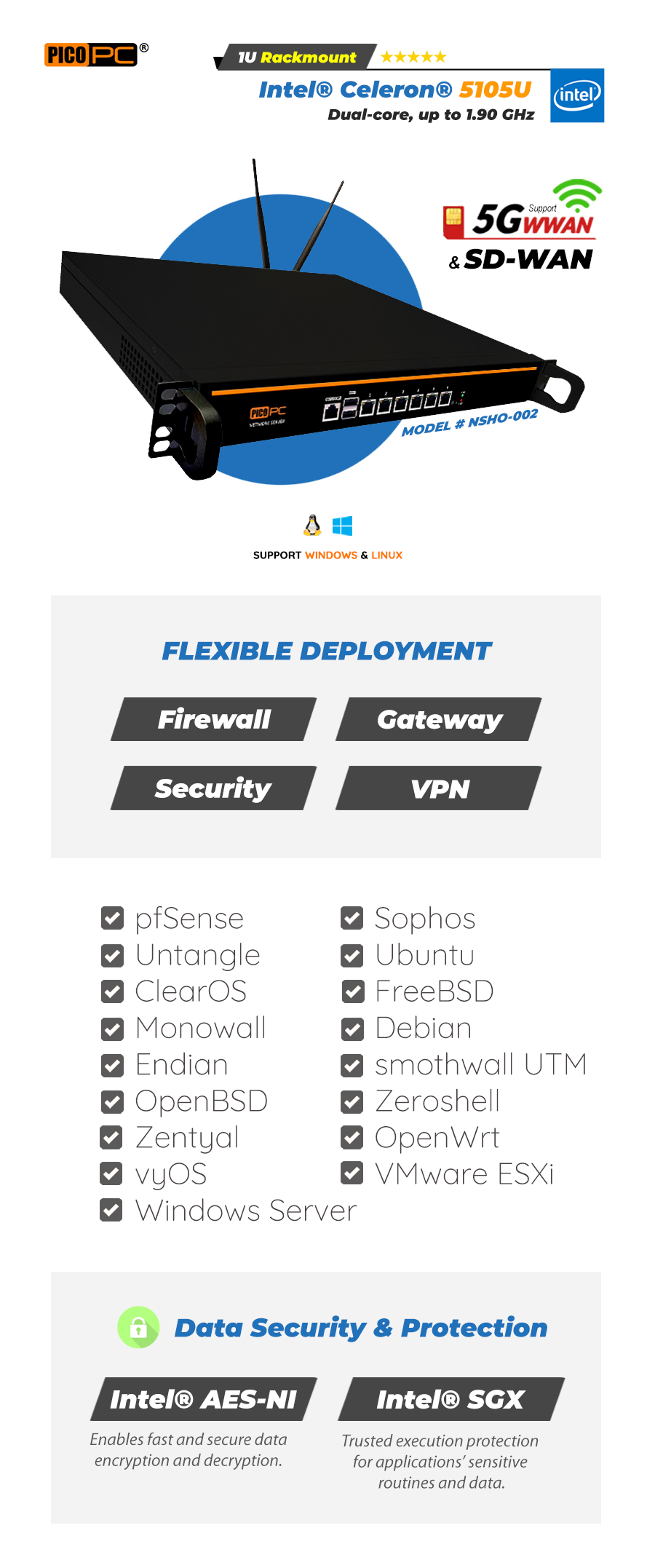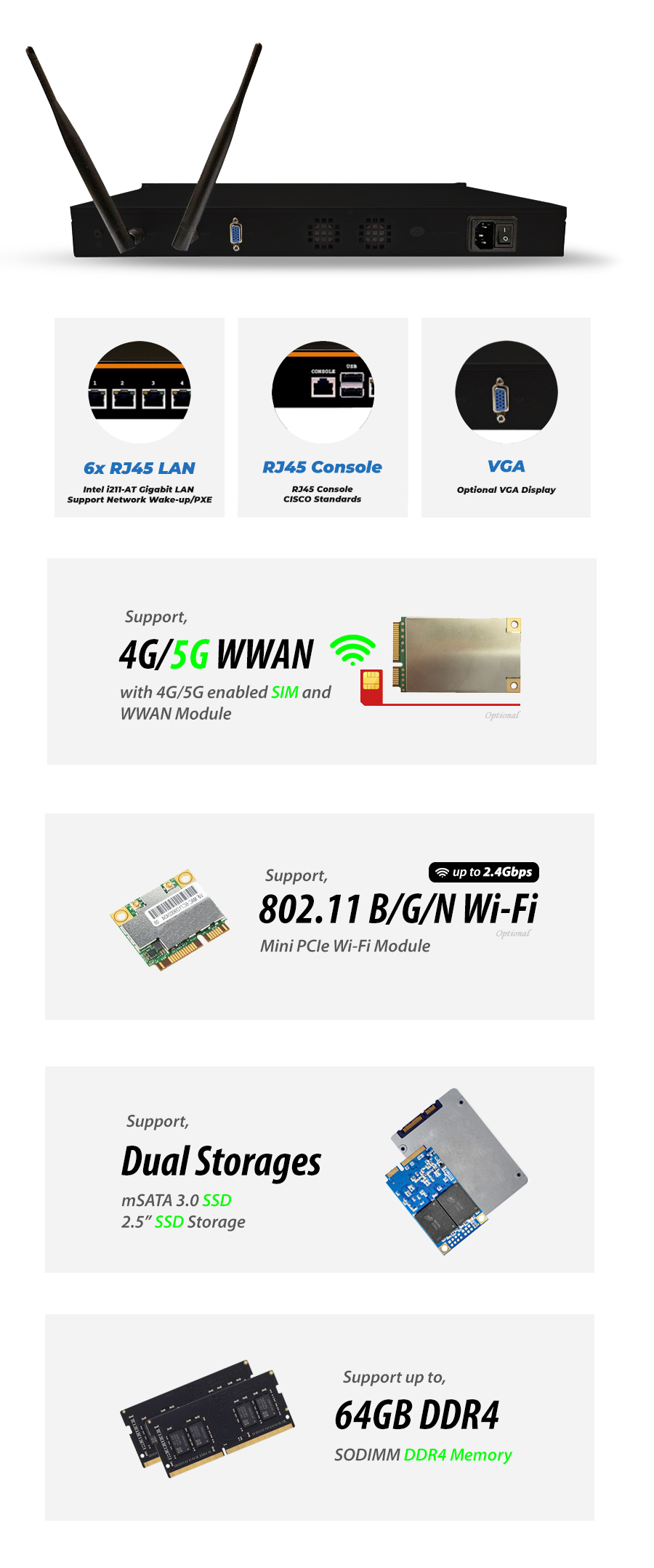PRODUCT CODE: NSHO-002
System | Model | PICO PC NSHO-002 |
P/N | NO027G05U1UND6L | |
Processor | CPU | Intel® Celeron® |
Frequency | 1.90 GHz | |
TDP | 15W | |
# of Cores | 2 | |
# of Threads | 2 | |
Cache | 2 MB | |
Memory | Size | Support up to 64GB (2x32GB) (optional) |
Type | SODIMM DDR4 (non-ECC) | |
Slot | 2 | |
Storage | mSATA | Support 1 x mSATA SSD (optional) |
Graphics | Port | VGA Display |
Features | Intel® UHD Graphics | |
Expansion Slots | mSATA | 1 x mSATA (For mSATA SSD) |
Mini PCIE/M.2 | 1 x Mini PCIE (For WiFi/4G Module) | |
1 x M.2 3042/3052 (For 5G Module) | ||
CPU Advanced Technologies | Intel® Speed Shift Technology | Yes |
Enhanced Intel SpeedStep® Technology | Yes | |
Thermal Monitoring Technologies | Yes | |
Intel® Flex Memory Access | Yes | |
Intel® Identity Protection Technology | Yes | |
Intel® AES New Instructions | Yes | |
Secure Key | Yes | |
Intel® Software Guard Extensions (Intel® SGX) | Yes | |
I/O Interfaces | LAN | 6 x Intel i211-AT Gigabit LAN (Support Network Wake-up/PXE) |
COM | 1 x RJ45 Console (CISCO Standard) | |
Display | 1 x VGA | |
USB | 2 x USB 2.0 | |
AC-In | AC 100-240V In (C13 Socket) | |
Switch | 1 x Power Switch | |
1 x Reset Switch | ||
LED Indicator | 1 x HDD LED | |
1 x Power LED | ||
OS | Windows | Support Windows 7/8/10 & Windows Server |
Linux | Support | |
Unix | Support | |
Power and | Power Input | AC 100-240V 50/60Hz |
Type | Internal PSU | |
Operating Temperature | -10C ~ 55C | |
Storage Temperature | -20C ~ 65C | |
Relative Humidity | 5% - 95% (relative humidity; non-condensing) | |
Vibration | 0.5g rms/5-500HZ/random/operating | |
Compliance | Approvals | CE |
Others | BIOS | AMI 64MB Flash ROM |
Cooling | Processor & System FAN | |
Watchdog | Support Hardware Reset Function (L256, 0~255 seconds) | |
Size | 430mm x 280mm x 45mm | |
Package | 1 x Network Server, 1 x Power Cord | |



This section describes the real-world performance with respect to different firewalls; showing details below. This will outline the technical specification & configurations required by a firewall administrator to operate and troubleshoot the hardware/software properly.
|
pfSense
Hardware Performance |
||
|
Total Firewall Throughput |
Firewall Throughput |
2.81 Gbps |
|
IPS Throughput |
2.0 Gbps |
|
|
Number of Users |
675-2,700 |
|
|
Firewall Sessions |
Concurrent Sessions (TCP) |
1.5 Million |
|
New Sessions/Second (TCP) |
60,000 |
|
|
IPSec VPN Peers |
600 |
|
|
IPSec VPN Tunnel Throughput |
IPSec VPN (TCP) AES-128
|
400 Mbps |
|
IPSec VPN (TCP) AES-256 |
355 Mbps |
|
|
IPSec VPN (UDP) AES-128
|
452 Mbps |
|
|
IPSec VPN (UDP) AES-256 |
445 Mbps |
|
|
OPEN VPN Throughput |
OPEN VPN (TCP) AES-256 Remote Access |
850 Mbps |
|
OPEN VPN (UDP) AES-256 Remote Access |
890 Mbps |
|
|
OPEN VPN (TCP) AES-256 end-to-end |
700 Mbps |
|
|
OPEN VPN (UDP) AES-256 end-to-end |
760 Mbps |
|
|
Bridge Mode Throughput |
L2 (TCP) |
965 Mbps |
|
L2 (UDP) |
960 Mbps |
|
|
NAT Mode Throughput |
L3 (TCP) |
960 Mbps |
|
L3 (UDP) |
958 Mbps |
|
|
Routed Mode Throughput |
L3 (TCP) |
954 Mbps |
|
L3 (UDP) |
955 Mbps |
|
|
Untangle
Hardware Performance |
||
|
Total Firewall Throughput |
Firewall Throughput |
2.80 Gbps |
|
IPS Throughput |
2.16 Gbps |
|
|
Number of Users |
675-2,700 |
|
|
Firewall Sessions |
Concurrent Sessions (TCP) |
1.2 Million |
|
New Sessions/Second (TCP) |
40,000 |
|
|
IPSec VPN Peers |
600 |
|
|
IPSec VPN Tunnel Throughput |
IPSec VPN (TCP) AES-128
|
525 Mbps |
|
IPSec VPN (TCP) AES-256 |
490 Mbps |
|
|
IPSec VPN (UDP) AES-128
|
480 Mbps |
|
|
IPSec VPN (UDP) AES-256 |
465 Mbps |
|
|
OPEN VPN Throughput |
OPEN VPN (TCP) AES-256 Remote Access |
500 Mbps |
|
OPEN VPN (UDP) AES-256 Remote Access |
740 Mbps |
|
|
OPEN VPN (TCP) AES-256 end-to-end |
465 Mbps |
|
|
OPEN VPN (UDP) AES-256 end-to-end |
600 Mbps |
|
|
Bridge Mode Throughput |
L2 (TCP) |
960 Mbps |
|
L2 (UDP) |
958 Mbps |
|
|
NAT Mode Throughput |
L3 (TCP) |
955 Mbps |
|
L3 (UDP) |
954 Mbps |
|
|
Routed Mode Throughput |
L3 (TCP) |
956 Mbps |
|
L3 (UDP) |
958 Mbps |
|
|
Sophos
Hardware Performance |
||
|
Total Firewall Throughput |
Firewall Throughput |
2.80 Gbps |
|
IPS Throughput |
1.72 Gbps |
|
|
Number of Users |
675-2,700 |
|
|
Firewall Sessions |
Concurrent Sessions (TCP) |
1.5 Million |
|
New Sessions/Second (TCP) |
60,000 |
|
|
IPSec VPN Peers |
600 |
|
|
IPSec VPN Tunnel Throughput |
IPSec VPN (TCP) AES-128
|
560 Mbps |
|
IPSec VPN (TCP) AES-256 |
500 Mbps |
|
|
IPSec VPN (UDP) AES-128
|
628 Mbps |
|
|
IPSec VPN (UDP) AES-256 |
610 Mbps |
|
|
OPEN VPN Throughput |
OPEN VPN (TCP) AES-256 Remote Access |
172 Mbps |
|
OPEN VPN (UDP) AES-256 Remote Access |
200 Mbps |
|
|
OPEN VPN (TCP) AES-256 end-to-end |
90 Mbps |
|
|
OPEN VPN (UDP) AES-256 end-to-end |
115 Mbps |
|
|
Bridge Mode Throughput |
L2 (TCP) |
958 Mbps |
|
L2 (UDP) |
960 Mbps |
|
|
NAT Mode Throughput |
L3 (TCP) |
955 Mbps |
|
L3 (UDP) |
958 Mbps |
|
|
Routed Mode Throughput |
L3 (TCP) |
952 Mbps |
|
L3 (UDP) |
956 Mbps |
|
|
Endian
Hardware Performance |
||
|
Total Firewall Throughput |
Firewall Throughput |
2.70 Gbps |
|
IPS Throughput |
1.92 Gbps |
|
|
Number of Users |
675-2,700 |
|
|
Firewall Sessions |
Concurrent Sessions (TCP) |
1.2 Million |
|
New Sessions/Second (TCP) |
45,000 |
|
|
IPSec VPN Peers |
600 |
|
|
IPSec VPN Tunnel Throughput |
IPSec VPN (TCP) AES-128
|
500 Mbps |
|
IPSec VPN (TCP) AES-256 |
590 Mbps |
|
|
IPSec VPN (UDP) AES-128
|
645 Mbps |
|
|
IPSec VPN (UDP) AES-256 |
620 Mbps |
|
|
OPEN VPN Throughput |
OPEN VPN (TCP) AES-256 Remote Access |
550 Mbps |
|
OPEN VPN (UDP) AES-256 Remote Access |
760 Mbps |
|
|
OPEN VPN (TCP) AES-256 end-to-end |
310 Mbps |
|
|
OPEN VPN (UDP) AES-256 end-to-end |
365 Mbps |
|
|
Bridge Mode Throughput |
L2 (TCP) |
957 Mbps |
|
L2 (UDP) |
960 Mbps |
|
|
NAT Mode Throughput |
L3 (TCP) |
954 Mbps |
|
L3 (UDP) |
956 Mbps |
|
|
Routed Mode Throughput |
L3 (TCP) |
951 Mbps |
|
L3 (UDP) |
955 Mbps |
|
|
Kerio Control Hardware Performance |
||
|
Total Firewall Throughput |
Firewall Throughput |
2.64 Gbps |
|
IPS Throughput |
1.6 Gbps |
|
|
Number of Users |
675-2,700 |
|
|
Firewall Sessions |
Concurrent Sessions (TCP) |
200 K |
|
New Sessions/Second (TCP) |
46,000 |
|
|
IPSec VPN Peers |
600 |
|
|
IPSec VPN Tunnel Throughput |
IPSec VPN (TCP) AES-128
|
225 Mbps |
|
IPSec VPN (TCP) AES-256 |
200 Mbps |
|
|
IPSec VPN (UDP) AES-128
|
450 Mbps |
|
|
IPSec VPN (UDP) AES-256 |
400 Mbps |
|
|
IPSec VPN Server Throughput |
IPSec VPN (TCP) AES-128 Remote Access
|
180 Mbps |
|
IPSec VPN (UDP) AES-128 Remote Access
|
210 Mbps |
|
|
IPSec VPN (TCP) AES-128 end-to-end |
90 Mbps |
|
|
IPSec VPN (UDP) AES-128 end-to-end |
105 Mbps |
|
|
KERIO VPN Throughput |
Kerio VPN (TCP) AES-256 Remote Access
|
700 Mbps |
|
Kerio VPN (UDP) AES-256 Remote Access
|
745 Mbps |
|
|
Kerio VPN (TCP) AES-256 end-to-end |
410 Mbps |
|
|
Kerio VPN (UDP) AES-256 end-to-end |
465 Mbps |
|
|
VLAN Mode Throughput |
L3 (TCP) |
952 Mbps |
|
L3 (UDP) |
958 Mbps |
|
|
NAT Mode Throughput |
L3 (TCP) |
950 Mbps |
|
L3 (UDP) |
956 Mbps |
|
|
Routed Mode Throughput |
L3 (TCP) |
959 Mbps |
|
L3 (UDP) |
960 Mbps |
|
|
OPNsense
Hardware Performance |
||
|
Total Firewall Throughput |
Firewall Throughput |
2.80 Gbps |
|
IPS Throughput |
1.12 Gbps |
|
|
Number of Users |
675-2,700 |
|
|
Firewall Sessions |
Concurrent Sessions (TCP) |
1.5 Million |
|
New Sessions/Second (TCP) |
80,000 |
|
|
IPSec VPN Peers |
600 |
|
|
IPSec VPN Tunnel Throughput |
IPSec VPN (TCP) AES-128
|
350 Mbps |
|
IPSec VPN (TCP) AES-256 |
310 Mbps |
|
|
IPSec VPN (UDP) AES-128
|
408 Mbps |
|
|
IPSec VPN (UDP) AES-256 |
340 Mbps |
|
|
OPEN VPN Throughput |
OPEN VPN (TCP) AES-256 Remote Access |
458 Mbps |
|
OPEN VPN (UDP) AES-256 Remote Access |
640 Mbps |
|
|
OPEN VPN (TCP) AES-256 end-to-end |
430 Mbps |
|
|
OPEN VPN (UDP) AES-256 end-to-end |
512 Mbps |
|
|
Bridge Mode Throughput |
L2 (TCP) |
965 Mbps |
|
L2 (UDP) |
961 Mbps |
|
|
NAT Mode Throughput |
L3 (TCP) |
956 Mbps |
|
L3 (UDP) |
958 Mbps |
|
|
Routed Mode Throughput |
L3 (TCP) |
956 Mbps |
|
L3 (UDP) |
957 Mbps |
|